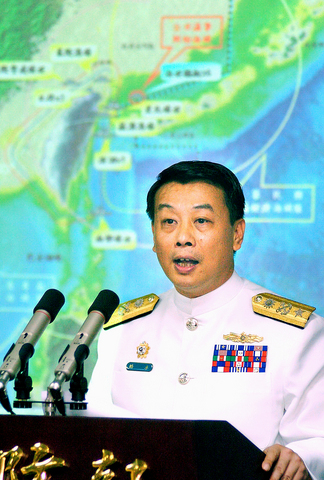Cabinet Spokesman Cho Jung-tai (
Cho said that Taiwan annually chases more fishing boats out of the disputed area than Japan does.
"Some have said that they will begin to hang China's national flag on their boats. I would urge them not to do so, because it will become difficult for us to protect them," Cho said.

PHOTO: LIAO CHEN-HUI, TAIPEI TIMES
He made the remark after local fishermen aired their problems with the government at a press conference yesterday morning.
The fishermen complained that the government was too weak to protect them while they were in the area. They said they were considering to rather fly China's national flag on their fishing boats to avoid trouble with Japanese patrols.
"It will become complicated and difficult for us if Taiwan's fishing boats begin to fly China's national flag," he said.
Cho added that Japan has chased away or confiscated more fishing boats from China than from Taiwan.
"Over the past year, 38 Chinese and 120 Korean fishing boats were either kicked out or confiscated by the Japanese government, while 11 Taiwanese fishing boats were targeted," he said.
"Expecting help from the Chinese government on this issue is merely wishful thinking," Cho said.
He said that Taiwan has chased away more fishing vessels in the region than any other nation.
"Our boats, including those of the coast guards and navy, kicked out more than 10,000 boats in the past year. So we did do our job to enforce the law within our territorial waters and to protect our fishermen in our economic areas," he said.
Regarding the conflict between Taiwanese fishermen and the Japanese government, Cho said that the government has submitted a letter of complaint to the Japanese government.
As for the dispute between Taiwan and Japan about the overlapping economic areas, the Cabinet spokesman said that both governments will try to solve the problem through negotiations.
He also urged fishermen not to protest against Japanese patrol vessels when they encounter them at sea to avoid potential injuries or loss.
"It is impossible for a fishing boat to fight against an armed patrol vessel. We want to end this dispute, but we want to end it peacefully," Cho said.
The current dispute was sparked on June 8, when a Japanese patrol boat drove away more than 10 Taiwanese fishing boats from an area about 150km northeast of Taiwan that is claimed by both the Taiwanese and Japanese governments. Taiwanese fishermen complained that, although the coast guard's vessels rushed to the scene, they did nothing.
On June 9, approximately 50 Taiwanese fishing boats returned to the area and surrounded a Japanese patrol boat in protest. No further conflict occurred.

‘DENIAL DEFENSE’: The US would increase its military presence with uncrewed ships, and submarines, while boosting defense in the Indo-Pacific, a Pete Hegseth memo said The US is reorienting its military strategy to focus primarily on deterring a potential Chinese invasion of Taiwan, a memo signed by US Secretary of Defense Pete Hegseth showed. The memo also called on Taiwan to increase its defense spending. The document, known as the “Interim National Defense Strategic Guidance,” was distributed this month and detailed the national defense plans of US President Donald Trump’s administration, an article in the Washington Post said on Saturday. It outlines how the US can prepare for a potential war with China and defend itself from threats in the “near abroad,” including Greenland and the Panama

A wild live dugong was found in Taiwan for the first time in 88 years, after it was accidentally caught by a fisher’s net on Tuesday in Yilan County’s Fenniaolin (粉鳥林). This is the first sighting of the species in Taiwan since 1937, having already been considered “extinct” in the country and considered as “vulnerable” by the International Union for Conservation of Nature. A fisher surnamed Chen (陳) went to Fenniaolin to collect the fish in his netting, but instead caught a 3m long, 500kg dugong. The fisher released the animal back into the wild, not realizing it was an endangered species at

The High Prosecutors’ Office yesterday withdrew an appeal against the acquittal of a former bank manager 22 years after his death, marking Taiwan’s first instance of prosecutors rendering posthumous justice to a wrongfully convicted defendant. Chu Ching-en (諸慶恩) — formerly a manager at the Taipei branch of BNP Paribas — was in 1999 accused by Weng Mao-chung (翁茂鍾), then-president of Chia Her Industrial Co, of forging a request for a fixed deposit of US$10 million by I-Hwa Industrial Co, a subsidiary of Chia Her, which was used as collateral. Chu was ruled not guilty in the first trial, but was found guilty

DEADLOCK: As the commission is unable to forum a quorum to review license renewal applications, the channel operators are not at fault and can air past their license date The National Communications Commission (NCC) yesterday said that the Public Television Service (PTS) and 36 other television and radio broadcasters could continue airing, despite the commission’s inability to meet a quorum to review their license renewal applications. The licenses of PTS and the other channels are set to expire between this month and June. The National Communications Commission Organization Act (國家通訊傳播委員會組織法) stipulates that the commission must meet the mandated quorum of four to hold a valid meeting. The seven-member commission currently has only three commissioners. “We have informed the channel operators of the progress we have made in reviewing their license renewal applications, and